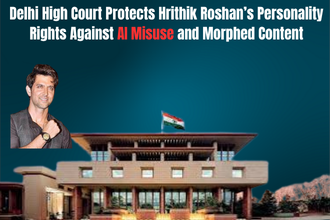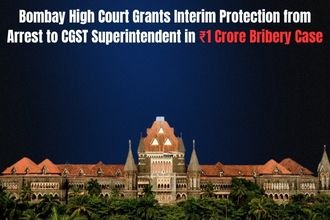In a significant step towards protecting celebrity identity in the era of Artificial Intelligence (AI) and digital impersonation, the Delhi High Court has granted interim protection to Bollywood actor Hrithik Roshan’s personality rights. The Court restrained unknown individuals (John Doe defendants) from misusing his name, image, likeness, voice, or other personal attributes to create AI-generated or morphed content, merchandise, or memes for commercial gain.
The case, titled Hrithik Roshan v. Ashok Kumar/John Doe & Ors., raises crucial issues about AI-driven impersonation, deepfakes, and personality rights — an emerging concern in India’s digital and entertainment landscape.
Background of the Case
Hrithik Roshan approached the Delhi High Court alleging that several websites, online sellers, and anonymous creators were exploiting his image and persona by producing vulgar, obscene, and AI-generated content. Such materials, he claimed, not only deceived fans but also caused serious damage to his reputation, goodwill, and right to privacy.
The actor further submitted that unauthorized merchandise featuring his name and image was being sold for profit, and that certain social media handles falsely portrayed him as being affiliated with or the founder of Markmonitor Inc., thereby misleading the public.
Roshan’s petition invoked violations under:
- The Copyright Act, 1957,
- The Trade Marks Act, 1999, and
- His constitutional and common law rights to privacy, reputation, and publicity.
Court’s Observations
Justice Manmeet Pritam Singh Arora, while granting interim relief, observed that Hrithik Roshan’s name, image, likeness, and personality attributes were protectable elements of his personality rights. The Court recognized that misuse of such traits—especially through AI or deepfake technology—could seriously harm an individual’s reputation.
The Court remarked:
“Prima facie, the Plaintiff’s personality traits and/or parts thereof, including his name Hrithik Roshan, voice, image, photograph, likeness, and other attributes are protectable elements of his personality rights. The Plaintiff is entitled to protect himself against impersonation, false, obscene, morphed, and distorted content created with the use of AI or otherwise, which is demeaning and lowers his reputation and goodwill.”
The Court also referred to its previous orders in similar matters involving Anil Kapoor, Karan Johar, and Jackie Shroff, reiterating that unauthorized commercial exploitation of a celebrity’s persona amounts to infringement and can be restrained by way of injunction.
Scope of the Injunction
The Delhi High Court issued an interim injunction against the John Doe defendants, restraining them from:
- Using Hrithik Roshan’s name, voice, image, likeness, or any other personality attribute for commercial purposes;
- Creating or circulating AI-generated, morphed, obscene, or deepfake content involving the actor;
- Selling or promoting unauthorized merchandise featuring his image or persona;
- Misrepresenting any association between Hrithik Roshan and third-party companies.
The order will remain in force until March 27, 2026, when the matter will be heard next.
Fan Pages and Non-Commercial Use
Interestingly, the Court drew a distinction between commercial misuse and *fan activity. During the hearing, Justice Arora clarified that *fan pages or non-commercial content on social media would not automatically be taken down, as such platforms often serve as expressions of admiration and creativity.
“I cannot take down fan pages at this stage. Instagram is not only for commercialisation; people use it for fun. This is not defamatory. Commercialisation and obscene morphing are different matters,” the Court observed.
When Hrithik Roshan’s counsel, Senior Advocate Sandeep Sethi, pointed to a dance tutorial club using the actor’s songs and dance steps, the Court held that such use did not amount to infringement, as it did not exploit his persona for commercial gain.
“They are not using your name commercially. It is a famous song of Hrithik Roshan used as a demo for teaching. At this stage, I am not persuaded,” Justice Arora remarked.
Directives to Digital Platforms
The Court also issued directions to major tech companies and e-commerce platforms for compliance and transparency:
- Google and Meta (Facebook and Instagram) were directed to provide Basic Subscriber Information (BSI) of users who created potentially infringing fan pages.
- The creators of such fan pages are to be impleaded as parties to the case and heard before any coercive action is taken against them.
- E-commerce websites and Domain Name Registrants (DNRs) were directed to furnish the BSI details of sellers within three weeks.
The Court emphasized the need for balance between protecting celebrity identity and preserving digital creativity and expression.
Counsels and Representation
- For Hrithik Roshan: Senior Advocate Sandeep Sethi with advocates Nizam Pasha, Parag Khandhar, Chandrima Mitra, Krishan Kumar, Tapan Radkar, Pratyusha Dhoddha, Sidharth Kaushik, and Shreya Sethi.
- For Meta: Advocates Varun Pathak, Varsha Jhavar, and Sana Banyal.
- For Google: Advocate Aditya Gupta.
- For Telegram: Advocate Anushka Sarda.
- For eBay Inc.: Advocates Nitin Sharma and Angad S. Makkar.
- For Amazon: Advocates Vivek Ayyagari, Srishti Dhoundiyal, and Manas Raghuvanshi.
Significance of the Order
This judgment adds to a growing body of Indian jurisprudence safeguarding personality rights in the context of AI, deepfakes, and digital media. Earlier, the Delhi High Court had passed similar protection orders for Anil Kapoor, Karan Johar, and Jackie Shroff, recognizing that misuse of a celebrity’s persona constitutes violation of privacy, misappropriation of goodwill, and unfair commercial gain.
The Hrithik Roshan order reinforces that:
- AI-generated impersonation can amount to defamation and invasion of privacy;
- Personality rights extend to protect one’s name, image, likeness, and distinctive traits;
- Courts are willing to issue John Doe injunctions to curb digital impersonation even against unknown offenders; and
- Fan expression remains protected so long as it is non-commercial and not defamatory.
This marks an important development in aligning Indian legal standards with global practices on image rights and digital identity, particularly as AI technologies continue to blur the line between reality and imitation.
Conclusion
The Delhi High Court’s decision in Hrithik Roshan v. Ashok Kumar/John Doe & Ors. represents a progressive step in protecting celebrity identity in the AI era. By recognizing the actor’s personality rights and granting injunctive relief against deepfakes and AI misuse, the Court has underlined the urgent need for legal safeguards in the face of technological abuse.
At the same time, the Court’s nuanced approach—distinguishing between commercial exploitation and fan creativity—ensures that the freedom of expression of genuine admirers remains untouched.
As India awaits comprehensive legislation on AI regulation and digital identity, cases like Hrithik Roshan’s are setting important precedents to protect individuals from misrepresentation, defamation, and digital impersonation in the virtual world.
Also Read



